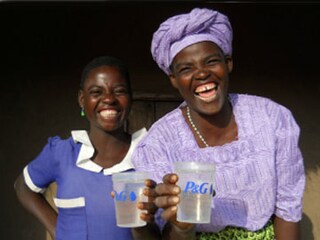The business of saving lives
For-profit business models can be used to help the income-poor in developing countries, and free giveaways are not always the best strategy


Conducting industry-changing research is costly, difficult and time consuming. It requires help – lots of help – from partners in industry and academia. But when the work has the potential to have a positive impact on millions of people living in some of the worst conditions around the world, it can be a very rewarding endeavor.
Lisa Jones Christensen (PhD '07) and Sridhar Balasubramanian compared the effectiveness of philanthropic and for-profit business models serving some of the poorest consumers in the world in a longitudinal field study with Enno Siemsen (PhD ’05), a professor at the Carlson School of Management at the University of Minnesota.
Working in partnership with Procter & Gamble, they analyzed differences in the uptake and usage of PUR water purification packets offered at different prices – moderate discount, deep discount and free – in three geographically separated but otherwise similar “base of the pyramid” (BoP) communities in Malawi in southeastern Africa.
Their findings from the field experiment yielded deep insights. They found that for-profit business models can be used to help the income-poor in developing countries, and that free giveaways are not always the best strategy.
Giving away the packets for free led to consumers taking the PUR packets in large numbers. The moderately discounted price, on the other hand, discouraged consumer purchase. But selling the packets at a positive but a deeply discounted price resulted in greater repeat purchases and more disciplined long-term use of the product in the correct way, yielding a superior overall benefit to consumers.
These results reverse the traditional models of philanthropy and some “aid-only” corporate social responsibility (CSR) initiatives, says Jones Christensen, assistant professor of strategy and entrepreneurship. “They have important implications for businesses seeking to make a positive impact and build their reputations – and can change the way they look at developing markets.”
Jones Christensen hopes their work will contribute to a more strategic approach to policy and business strategy. “There’s always a role for aid and philanthropy, but people can shift their funds to business-oriented solutions,” she says. “Business can be part of the solution, not part of the problem.”
The study also paints a more accurate picture of poverty.
“It offers a more nuanced view of people who deserve a lot of respect,” she says. “Many people worldwide are waging a really difficult fight for survival and success, and I think the study provides us with a richer view of who they are and how they make decisions.”
By thinking of people in these markets not as victims of poverty but as consumers with needs, “we can develop business models with products that are particularly suited for them,” adds co-author Siemsen. “Not only will we help more people this way, but sometimes companies can turn a profit in doing so.”
An unexpected finding from their study is the delay in decision making by consumers, says Jones Christensen. “People appear to have taken some time for deliberation.”
“We don’t know if they’re saving up for the purchase or talking to other people as part of a social exchange of information that is ultimately influencing purchase decisions,” she says. “Price is just one factor alongside many other psychological considerations that are influential when you’re living in deep poverty.”
“I’m proud of the commitment from the community, from our business partner Greg Allgood – who founded Procter & Gamble’s Children’s Safe Drinking Water Program – and from my fellow researchers,” says Jones Christensen.
“I’m also proud that UNC Kenan-Flagler supports this kind of work and gives researchers the chance to address these long-term research questions in difficult locales. Longitudinal field research like this – in difficult locations – is important and can allow us to address some issues that are central to our shared future.”
Balasubramanian agrees. “It is such a privilege to work in these markets, and to be able to provide insights to companies that can actually help improve and save lives,” he says.
First Published: Nov 25, 2015, 06:06
Subscribe Now